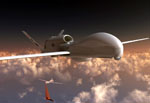Northrop Grumman's Global Hawk Unmanned Aircraft Deploys Worldwide
 ANDERSEN AFB, Guam, Sept. 20, 2010 (GLOBE NEWSWIRE) -- Northrop Grumman Corporation (NYSE:NOC) and the U.S. Air Force commemorated the milestone deployment of the first RQ-4 Global Hawk unmanned aircraft system (UAS) to Pacific Command (PACOM) with an arrival ceremony Sept. 20 at Andersen Air Force Base, Guam. Designated AF-20, the aircraft landed successfully Sept. 1 after an 18-hour flight from its main operating base at Beale Air Force Base, Calif.
ANDERSEN AFB, Guam, Sept. 20, 2010 (GLOBE NEWSWIRE) -- Northrop Grumman Corporation (NYSE:NOC) and the U.S. Air Force commemorated the milestone deployment of the first RQ-4 Global Hawk unmanned aircraft system (UAS) to Pacific Command (PACOM) with an arrival ceremony Sept. 20 at Andersen Air Force Base, Guam. Designated AF-20, the aircraft landed successfully Sept. 1 after an 18-hour flight from its main operating base at Beale Air Force Base, Calif.
"We believe that an intelligence, surveillance and reconnaissance (ISR) capability within the Pacific theater meets the needs of U.S. Air Force operations and will help the U.S. and its partners and allies address common regional challenges such as humanitarian assistance, disaster relief, terrorism, and piracy," said Gen. Gary L. North, commander of the Pacific Air Forces and Air Component for U.S. PACOM. "Having the Global Hawk in the Pacific encourages a dialogue for regional cooperation, security and stability in this region."
The historical landing in Guam not only signified the stand-up of a new forward-operating location and first permanent overseas basing of the high-altitude, long-endurance UAS, but it also marked the 45,000th flight hour for the Global Hawk program. In addition to PACOM, Global Hawk has also been forward-deployed to European Command, or EUCOM, forces at Naval Air Station Sigonella, Italy, where another Block 30 Global Hawk, designated AF-15, arrived Sept. 15. Block 30 Global Hawks will be based at both Sigonella and Andersen and will be operational in early 2011.
"These remarkable accomplishments demonstrate why we refer to 2010 as the year of Global Hawk," said Duke Dufresne, sector vice president and general manager of the Strike and Surveillance Systems Division for Northrop Grumman's Aerospace Systems sector. "Global Hawk will now be covering nearly every part of the globe, thanks to the dedication and efforts of the entire military and industry team. The Global Hawks are not only combat-proven with more than 35,000 combat hours, but they have also been employed this year during the Haiti earthquake in January and during several Atlantic and Pacific hurricanes in August and September."
Cruising at extremely high altitudes and above ordinary, commercial traffic, the RQ-4 Global Hawk can survey large geographic areas with pinpoint accuracy, giving government and military decision-makers the most current information available during a crisis or contingency situation and providing them with near real-time, high-resolution ISR imagery that can support full-spectrum operations.